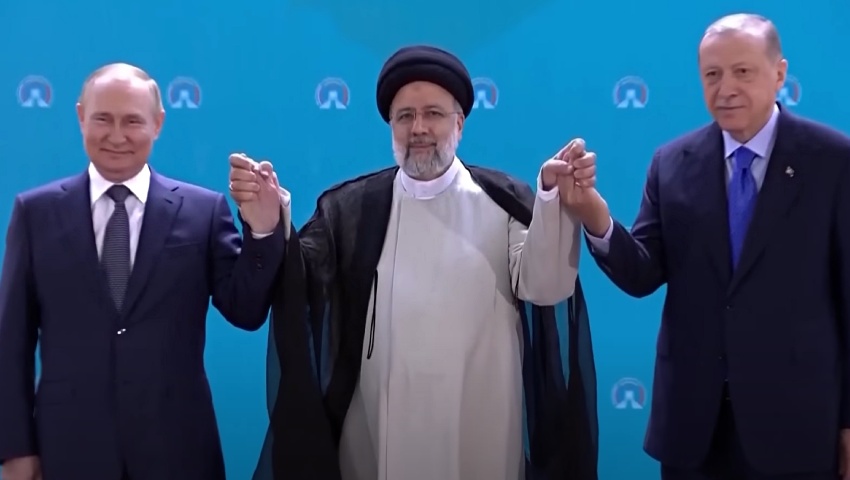Russian President Vladimir Putin’s visit to Iran this week has demonstrated that Russia has not become the international loner that many may think.
While many pundits were fixated on US President Joe Biden’s visit to the Middle East this week, Russian President Vladimir Putin similarly touched down in Iran to commence a round of diplomatic talks with regional stakeholders.
Of course, you would be forgiven for not realising that Putin was visiting Iran, especially as Biden’s gaffes took centre stage – mistakes so seemingly common that one could set their watch to them.
“To keep alive the truth and honour of the holocaust,” Biden said having touched down in Israel, before correcting himself to “horror”.
Biden leaves crowd in STUNNED silence during official Israel visit after telling them to “keep alive the honor of the Holocaust” after his brain BREAKS
— Benny Johnson (@bennyjohnson) July 13, 2022
pic.twitter.com/xS6FFOtf0x
If that wasn’t enough, there was the worldwide focus on the awkward first encounter between Crown Prince Mohammed bin Salman and Biden after years of attacks from Biden levelled at the Kingdom.
President #Biden received by Crown Prince #MBS pic.twitter.com/evAdyMjQeb
— Ali Shihabi علي الشهابي (@aliShihabi) July 15, 2022
This was topped off by the awkward Khashoggi encounters and questions.
At the end of a meeting between President Biden and Crown Prince Mohammed bin Salman of Saudi Arabia, an NBC News reporter, Peter Alexander, shouted “Jamal Khashoggi, will you apologize to his family?” Prince Mohammed and Biden ignored the question. https://t.co/aJWzG21P9T pic.twitter.com/PDyfPSwN1n
— The New York Times (@nytimes) July 15, 2022
With the Kingdom deferring to OPEC to regulate the supply of oil, thwarting Biden’s hopes of increasing Saudi oil production, it would appear that the overseas trip did more damage than good to the US-led international liberal order.
Though, while the world watched Biden, Putin conducted a tour of resurgent diplomacy, meeting Iranian President Ebrahim Raisi and Turkish President Recep Tayyip Erdogan at a leaders’ summit in Tehran. On the agenda: Syria and Ukrainian grain.
Turkey is uniquely positioned as a broker between Russia and the West on the question of Ukrainian grain exports, overseeing military maritime movement through Istanbul into the Black Sea. For centuries, the two nations have been at a loggerhead, a competition that was worsened when Turkish F-16s downed a Russian Su-24 in 2015.
While the meeting has yet to cement definitive outcomes for the movement of grain, the leaders praised one another. It was reported that Erdogan said that Russia’s attitude toward grain would “have a positive impact on the whole world”, while Russia thanked Turkey for its role in the negotiations.
Though the agreement has come at a cost to the Western sanctions’ regime.
According to Patrick Wintour in The Guardian, the deal is expected to see the Russian Navy lift the blockade of key ports in return for the EU unfreezing “economic resources owned by seven top Russian lenders”.
When most sanctions experts argue that sanctions require long-term implementation to cause structural degradation, such announcements come as a surprise.
Unsurprisingly, throughout Putin’s diplomatic mission, Russia received a thorough endorsement of the invasion of Ukraine from Iran’s Supreme Leader Ali Khamenei.
“In the case of Ukraine, had you not taken the initiative, the other side would have taken the initiative and caused the war,” Khamenei reportedly remarked on the war.
“NATO would know no bounds if the way was open to it. And if it was not stopped in Ukraine, it would start the same war some time later using Crimea as a pretext.”
While it is unsurprising that Iran should endorse its ally or that Turkey should look to hedge itself between the autocratic and the liberal world orders, the meeting between the three leaders has highlighted a changing balance of power in the Middle East between the traditional and oversimplified Saudi-led and Iranian-led axes.
According to Wintour’s report of the meeting in The Guardian, Turkey has entered into economic and trade agreements with Iran with Erdogan noting that “he opposed Western sanctions on Iran over its nuclear programme”.
Indeed, a policy of rebalancing by key stakeholders such as Turkey in the Middle East would be unsurprising to many observers.
Despite being a member of NATO, Turkey purchased Russian S-400 surface-to-air missiles in 2017 for an estimated US$2.5 billion, prompting the US to remove the nation from the F-35 program.
Apprehension from US policymakers regarding Turkey’s entry into the program have not subsided.
Speaking to the US Defense Writers Group in June 2022, Rep. Adam Smith outlined the US government’s intention to keep Turkey at an arm’s length from the F-35s.
“Turkey’s not coming back into the F-35 program,” Smith said.
“It’s not about, you know, punishing Turkey for buying Russian weapons systems. It’s about not having the S-400 in the same place as the F-35 and the potential loss of critical information there to the Russians on that.”
Removal from the program has prompted ire from Ankara, with the Turkish government noting that it had financially contributed to the development of the F-35 program with the expectation that it would be able to purchase the weapons systems.
On an international level, Russia is not as isolated as many Western pundits may think – and considering recent developments in the Ankara-Tehran relationship, the balance-of-power in the Middle East may shift out of the US’ grasp.
Get involved with the discussion and let us know your thoughts on Australia’s future role and position in the Indo-Pacific region and what you would like to see from Australia's political leaders in terms of partisan and bipartisan agenda setting in the comments section below, or get in touch with









